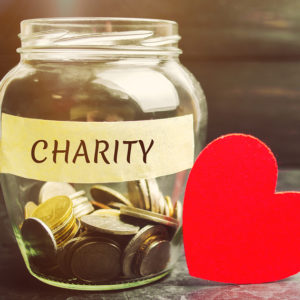More than a decade ago I lost the love of my life in a plane crash. I was a recent college graduate, fresh off an internship with the National Journalism Center. My best years were supposed to be ahead of me but, at only 22, I felt like my life was over.
If it weren’t for the kindness of family and friends, and an unexpected call from a former journalism adviser inviting me to participate in a fellowship program, I might have despaired during the slow recovery years that followed.
The journalism fellowship, it turns out, morphed into a full-time job at the same paper where I served my fellowship. The opportunity, made possible by a group of charitable givers, gave me the experience I needed to land an even better job in Washington only two years later.
All that to say, the corporation I worked for at the time of my bereavement — and all the government programs I paid into up until that point — let me down after my loss, but a group of private givers gave me hope.
My lost love and I, for example, weren’t married. Therefore, I wasn’t entitled to survivor benefits. I wasn’t even eligible for bereavement leave. Instead, I had a mountain of non-dischargeable student loans to pay off. I needed a break, and it didn’t come from corporate America or Uncle Sam.
The hardship and grief, however difficult, did have the upside of making me more aware of others in a similar boat and gave me a desire to emulate the kindness of everyone who took a chance on me in the early stages of grief.
With the pandemic still raging in parts of the world and war in Ukraine, the need to help others has never been more urgent. But rising gas, food and housing prices increasingly cut into resources that might otherwise go to charitable-relief efforts.
For this reason, Congress should do everything it can to empower seasoned givers, like those who funded my fellowship, and people like me: a middle-class American who wants to give more money to charity but whose budget is getting squeezed by rising costs and wages that aren’t keeping up with inflation.
Congress should pass the Universal Giving and Pandemic Recovery Act. If enacted, the bipartisan bill would renew and create an even bigger universal charitable deduction than the one rolled out in 2020 as part of the pandemic relief package.
The universal charitable tax deduction enacted two years ago was only temporary but enabled taxpayers who don’t itemize to claim up to $300 ($600 for joint filers) in charitable tax deductions. As it turns out, the deduction was popular among non-itemizers.
As John Biedermann, chair of the Fundraising Effectiveness Project, told the Nonprofit Times, he found it “striking” that, on New Year’s Eve 2020, there was a 28 percent spike in $300 charitable gifts — “exactly the maximum amount a donor can take using the universal charitable deduction.”
Moreover, according to the Philanthropy Roundtable, the legislation would make contributions to donor-advised funds eligible for the universal charitable tax deduction. This would help democratize the financial tool even more and allow everyday givers to likewise grow their charitable dollars.
Americans are in the trenches. Whether suffering the loss of a loved one taken too soon by COVID-19, watching a loved one slip away to opioid addiction or witnessing the melancholy of someone trying to cope with dreams deferred, Americans know best where to put their charitable dollars.
Congress should unleash that hard-earned, boots-on-the-ground intelligence and give those soldiering through hard times more wiggle room in their budget to dig a little deeper into their pocketbooks and empower those falling through the cracks.

